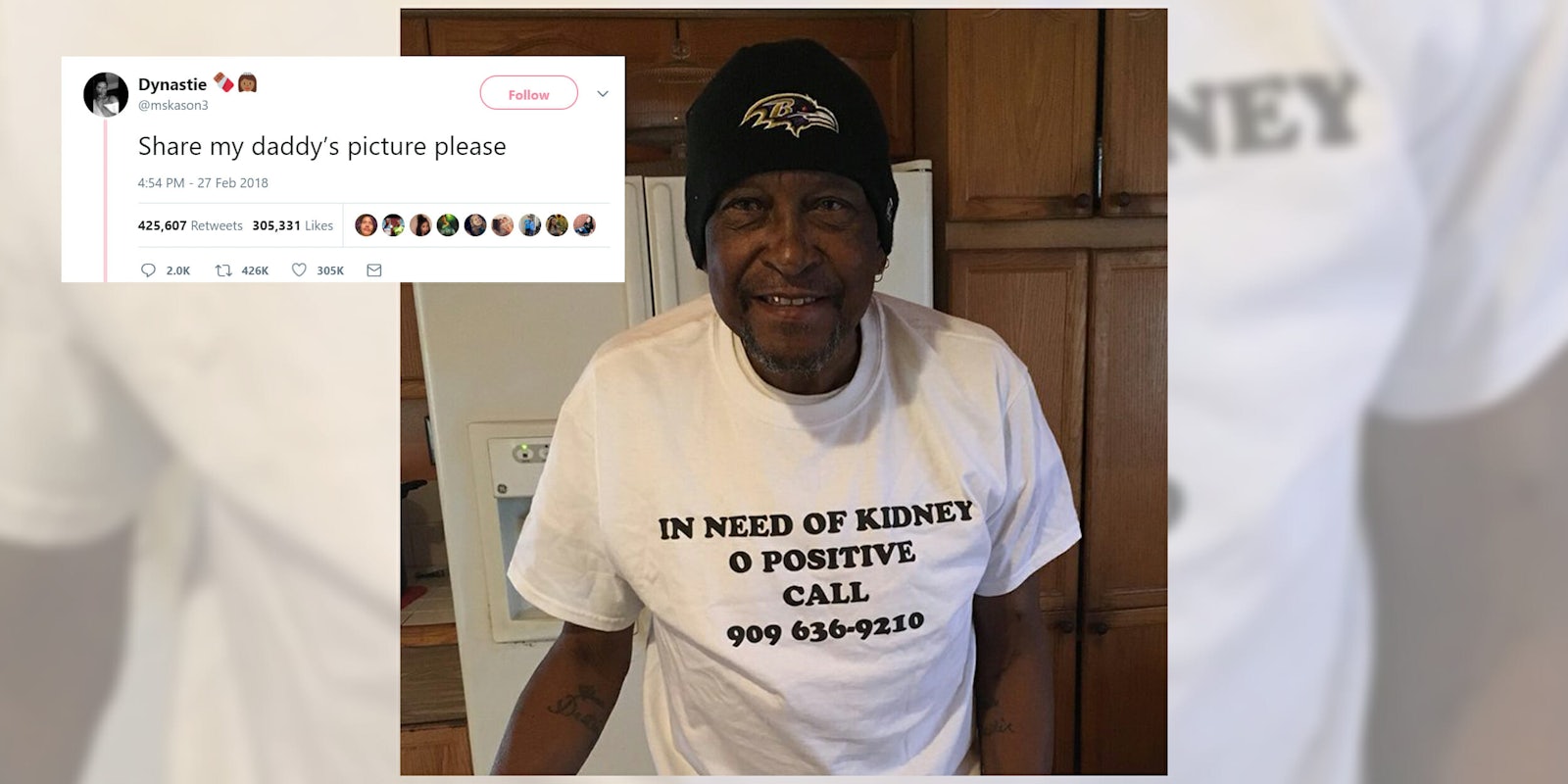California resident Dynastie Cason took to Twitter in late February to post a photo of her father who needs a kidney. The photo, which has since been retweeted more than 400,000 times, has been met with countless offers from willing donors around the country and the world.
While kidney failure patients can get by on dialysis for years, it comes with some significant downsides. Kidney transplants often have positive outcomes, but the wait to receive a transplant can be anguishing for those without functioning kidneys. There are more than 100,000 people waiting for a kidney in the U.S., according to the National Kidney Foundation, and the average wait time is more than three years. Part of the hold up is finding a matching donor, which is why Cason and others are using Twitter to find hope for their loved ones.
Share my daddy’s picture please pic.twitter.com/V7QoEmtfqd
— Dynastie 🍫👸🏾 (@mskason3) February 27, 2018
“I didn’t think people would be willing to donate,” Cason told ABC Eyewitness News after posting the tweet. “They don’t even know him. This is just a blessing.”
Cason’s father, Clarence Johnson, is still unsure of whether he qualifies for a transplant because of his age. Johnson is turning 70 this year, according to Cason. He was diagnosed with kidney failure in April of last year and still needs to wait “a few weeks” and take a series of classes to try to qualify for eligibility, Cason said.
In the meantime, a family member made a shirt for him which reads, “In need of kidney. O positive. Call 909 636-9210.”
Cason said on Twitter she has received an “overflow” of messages about the kidney. Reactions to the post have ranged from “Let’s talk about what he needs!” to responses from people who also have a loved in need of an organ.
https://twitter.com/NerdGoatee/status/976568107866075136
https://twitter.com/IsabelleTarver/status/968747958081552390
https://twitter.com/slimreaper____/status/968956329493712896
The reason that blood type compatibility is important for transplants is that compatible types increase the chance that the recipient’s body accepts the new kidney, according to UC Davis Transplant Center. If a donor’s blood type is compatible with the recipient, more blood tests will be conducted before surgery, such as tissue typing and cross-matching.
Misconceptions about kidney donation have circulated with similar posts on Twitter asking for kidney donors, including the false belief that selling a kidney is legal in the United States. (It’s illegal.)
How much they payin?
— 12Years A Side Nigga (@keemiemillz) March 21, 2018
Some Twitter users are also commenting on the posts saying they are not a match because they have an O-negative type blood. O is the universal blood type and if you have this type, you can donate to anyone. For a transplant, the Rh factor (positive or negative) of blood does not matter.
https://twitter.com/FranktheMc2/status/976866248964403202
You don’t have to go far to find other patients in a similar predicament. One Michigan resident, Fredrick Hogan, is O positive and needs a kidney. He also went viral with a T-shirt made by his family members. Hogan told the Daily Dot he has been on the national waiting list for more than three years.
https://twitter.com/martyBADASS/status/976147696829464576
“My doctor told me to tell my story,” Hogan said. “He said ‘You’d be surprised how many people may want to help you if they knew you needed a kidney.’”
Hogan’s daughter posted the photo on social media, and he has since been contacted by so many people that he had to set up a separate phone number to redirect voicemail traffic.
“Next thing you know, my phone won’t stop ringing,” Hogan said. “I never in a million years imagined the response I would get and how many people are potentially interested in giving me a kidney and saving a life.”
Hogan said he wishes more people knew about blood type compatibility and how easy the process is to find a match with a person in need.
“I would love to get the word out and get people more educated,” Hogan said. “It’s actually a pretty simple process.”
Hogan said no matter where the potential donor is, they can contact his coordinator, who will ask up-front questions before any tests can be done. These include whether the donor is diabetic, if they take blood pressure medication, and their age.
While the process for getting matched may be easy, The American Transplant Foundation reports living donation surgery involves the same level of risk for the donor as any other major surgery. If you’re interested in becoming a donor, you should read through the foundation’s guide to see if you’re ready for the commitment.
Hogan said he has already reached out to some qualifying people from Twitter and looks forward to getting back to a higher quality of life if he is able to receive a transplant.
“It would mean the world to me, it would be saving a life,” Hogan said. “I could get my life back to normal and continue to build my legacy, take care of my kids, and take care of my family.”
Some donors report positive emotional experiences after giving away an organ, according to Living Donation California.
The Daily Dot also reached out to Johnson but did not receive an immediate response for comment. Both Johnson and Hogan still require kidney dialysis.
If you would like to make a living donation, visit Donate A Life to consider your options.


